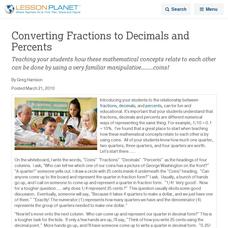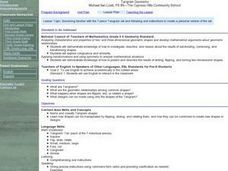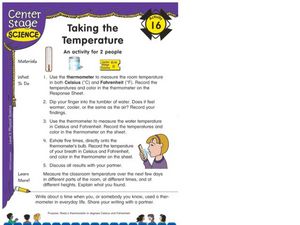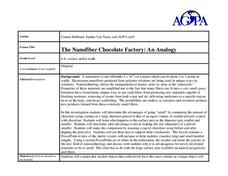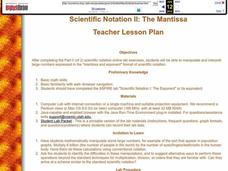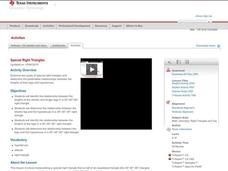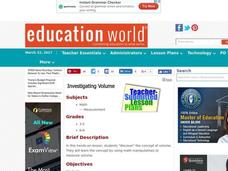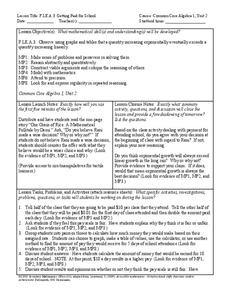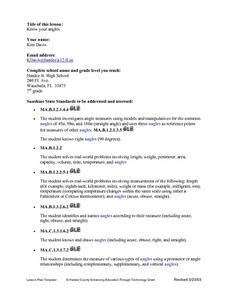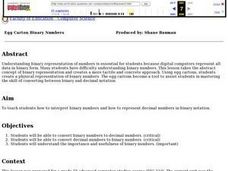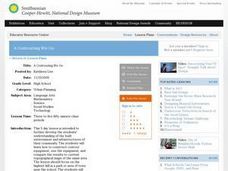Curated OER
One More, One Less - A Practice
Students practice adding one more item and taking away one more item to figure for one more, and one less of a number. In this one more and one less lesson plan, students use manipulatives.
Curated OER
Put Your Hands on the Values-Math Manipulatives
Fifth graders visit Web sites on the World Wide Web for interactive practice in recognizing place value for numbers. They work in teams of two to practice identifying place values of whole number and decimals by creating place value cards.
Curated OER
"Math Curse" by Jon Scieszka & Lane Smith
Students use estimation and measurement skills to make predictions and solve problems involving length.
Curated OER
Border Math
Students examine and interpret data relating to U.S.-Mexico borderland realities, and consider such aspects of social science as the study of population, crime, government spending, pollution, health, and economics.
Curated OER
Converting Fractions to Decimals and Percents
Teaching your students how these mathematical concepts relate to each other can be done by using a very familiar manipulative.......coins!
Curated OER
Tangram Geometry
Students listen to a story involving Tangram pieces. Students use Tangram pieces to complete shapes using an outline of a design.
Curated OER
Prime & Composite Numbers: Algebra/Geometry Institute 2009
Students create factor trees. In this prime and composite lesson, students model fractions using tiles. They create factor trees and identify prime and composite numbers. Students use grid paper and tiles to model numbers. A...
Curated OER
Taking the Temperature
Students read a thermometer in Celsius and Fahrenheit. In this thermometer reading lesson, students take the temperature in different situations and discuss the results with a partner.
Curated OER
The Nanofiber Chocolate Factory: An Analogy
Middle schoolers investigate Nanotechnology. In this physic's lesson, students evaluate a hands-on model made from chocolate syrup and pretzels to determine the advantages of size. Middle schoolers weigh chocolate syrup to determine...
Curated OER
Can You Name That Shape?
Learners use materials to build, investigate, and draw two-dimensional shapes (polygons). They combine the shapes they have built and draw from the pile to begin a round-robin activity to name and determine the attributes of a selection...
Curated OER
Scientific Notation II: The Mantissa
Practice converting a conventional number into scientific notation, and vice-versa. Using an applet, they perform the operations of multiplication and division on numbers expressed in scientific notation.
Curated OER
Using Groups of Ten to Solve Problems
Upper graders solve math problems involving multiplication using specific strategies. They will use base-ten blocks, hundreds charts, and number lines to solve multiplication problems. Then they will practice several of the strategies...
Curated OER
Influence and Outliers
Using the TI-Nspire calculator, statisicians identify outliers and their effect on the least-squares regression line. In finding the line of best fit, they determine what points will affect the least squares regressions and what points...
Curated OER
Multiplication Magic
Investigate multiplication problem solving strategies by working with base 10 blocks. Learners decompose problems with a Merlin the Magician theme. Multiple resources are provided.
Curated OER
Special Right Triangles
Using the Pythagorean Theorem to solve for missing angles, young scholars evaluate right triangles and their properties.
Curated OER
Completing the Square
Solve equations by completing the square. The pupils factor quadratic equations and graph the parabola. They also identify the different terms in the equation and look for patterns.
Education World
Investigating Volume
Explore the concept of volume using unit cubes. Working individually or in small groups, your class measures with a ruler in inches and calculates the volume of various rectangular household boxes (provided by the teacher) and completes...
Alabama Learning Exchange
Exponents and Division
Create a human fraction to learn about division of exponents. Scholars develop the rule for division of exponents by being part of a human fraction to explore and justify the rule. They also consider zero exponents and negative exponents.
Howard County Schools
Getting Paid for School
What if you were paid to attend class? What kind of payment schedule would you choose? Learn how exponential functions will eventually exceed linear functions by comparing two different payment schedules for attending class.
Missouri Department of Elementary
Are You Balanced?
Balance scales create a strong visual of how an individual prioritizes one's self alongside their commitments to the community, school, and home. Scholars complete a graphic organizer then discuss their findings with their peers. A...
Curated OER
Know Your Angles
Explore types of angles and the characteristics of each. After observing a PowerPoint Presentation, learners tour the school facilities and use a digital camera to capture prescribed angles. Using the digital pictures and written...
Curated OER
Egg Carton Binary Numbers
Learners take the abstract concept of binary representation and create a more tactile and concrete approach. Using egg cartons, they create a physical representation of binary numbers. The egg cartons become a tool to assist students in...
Curated OER
A Contouring We Go
Students examine the built environment and infrastructures of their community by constructing contour equipment, using the equipment, and comparing their results to current topographical maps of the same area
Curated OER
Division by Fractions (Part One)
Learners demonstrate array models to illustrate division as sharing and grouping. They demonstrate the array models to compare division as sharing with division as grouping. Pupils explore division problems are typically seen as either...






